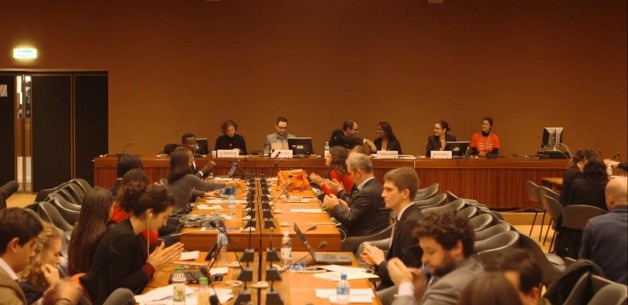During the 4th Annual UN Forum on Business and Human Rights in Geneva from November 16-19, 2015, BIC’s Maggie Federici participated in a panel entitled Development Finance Institutions: Human Rights Obligations and the Right to Remedy.
Development finance institutions (DFIs) have a mandate to alleviate poverty and promote sustainable development. But, in many cases, projects funded by these institutions lead to social and environmental harm, including serious human rights abuses. Such abuses include forced evictions, violations of workers’ and indigenous peoples’ rights, and reprisals against communities and human rights defenders who speak out against such projects. Abuses like these often result in further impoverishment of marginalized and vulnerable populations. The World Bank and many other development banks – international, regional, and national – have in place safeguard policies designed to prevent environmental and social harm and accountability mechanisms to address violations of these policies. While these policies and mechanisms may be leveraged to protect communities and the environment, they do not sufficiently address rights-related risks or provide protection to human rights defenders.
See the video here: http://webtv.un.org/watch/development-finance-institutions-forum-on-business-and-human-rights-2015/4640385236001
Despite the fact that the World Bank has a development mission, its projects often produce the same negative outcomes for communities associated with corporate negligence. Whether through its private lending arm, the International Finance Corporation (IFC), public-private partnerships, or ‘financial intermediaries’, World Bank money makes its way into the hands of private actors. The panel “Development Finance Institutions: Human Rights Obligations and the Right to Remedy” shed light on the importance of including international finance institutions in the conversation around business and human rights.
The central premise of BIC panelist Maggie Federici’s presentation was that insufficient World Bank protections for vulnerable populations are undermining its anti-poverty mission. She highlighted the World Bank’s safeguards review and the opportunity it presents to advocate for stronger protections for the rights of poor and vulnerable groups affected by development projects.
She also discussed a case recently covered by the International Consortium of Investigative Journalists (ICIJ) involving the impacts of a loan made by the IFC to a large agribusiness company operating in Indonesia. The case illustrates how between 2003 and 2008, IFC financing boosted the oil palm industry on the Indonesian island of Sumatra, resulting in the violent eviction of indigenous groups from their ancestral lands. The ICIJ report, which quotes BIC Child Rights Program Manager Elana Berger, highlights the impacts of these forced evictions on an indigenous child named Revan, who four years later, still relives the trauma of the event as his parents struggle to provide their family with the same nutrition, education and medical care they had access to before they were displaced.
BIC proposed three recommendations for ensuring that the World Bank does not further marginalize and impoverish those who should be benefitting most from its projects:
- Streamline policy language on vulnerable groups throughout the proposed safeguards policies, which not only ensures more complete protection, but also gives communities a basis for redress should they feel that their rights are violated by a World Bank project
- Produce differentiated risk assessments and disaggregated baseline data that examine potential impacts on vulnerable groups separately and
- Protect vulnerable groups’ right to participate in consultations on all World Bank projects, regardless of sector. This means ensuring that vulnerable persons’ voices are heard not only in those projects where they are the target beneficiaries, for instance in the health or education sectors, but also where their rights are likely at risk, such as in energy infrastructure projects.


